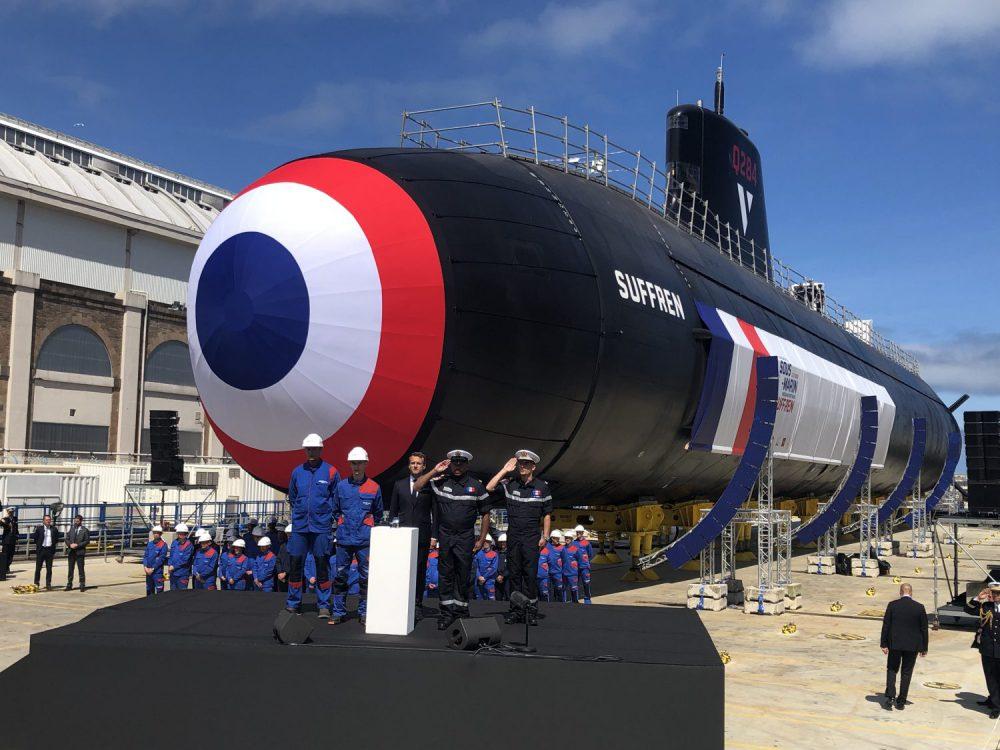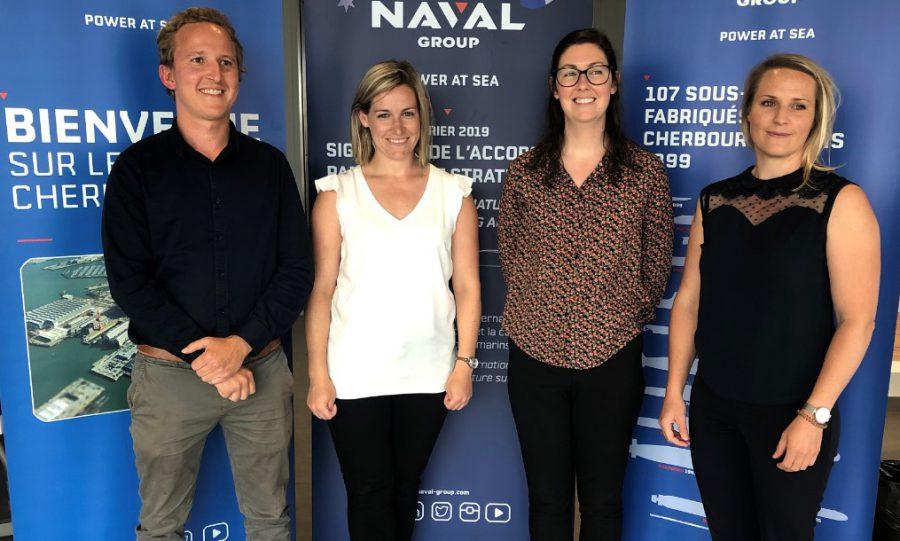France launches first nuclear-powered cousin of RAN’s new submarines
Posted By Brendan Nicholson on July 30, 2019 @ 06:00

As the French launched the first of their Barracuda-class nuclear-powered attack submarines this month, the transfer of advanced intellectual property to Australia for its conventionally powered cousin gathered momentum.
So far, 19 engineers from Naval Group Australia have moved to the French port of Cherbourg to work with, and learn from, their parent company counterparts. The engineers from diverse disciplines will to return to Australia from 2022 with an intimate understanding of submarine technology to be applied to the 12 Attack-class diesel-electric submarines to be built in Adelaide for the Royal Australian Navy.
They will join the program’s ‘design authority’ engineering team responsible for ensuring the smooth transfer of IP and will manage the end of the detailed design process and later the submarines’ sustainment.
Among them are Terrence Byrnes, an electrical engineer, and Siobhan Giles, an acoustics engineer, both from Adelaide; Georgia McLinden, a methods and tools engineer from Perth; and Anna Erikson, a naval architect specialising in physics and mechanical engineering who came to Australia originally from Sweden to work on the Collins-class submarine.

So far, about 500 specialists are working on the design in France and 100 more in Australia.
More Australian engineers will be sent to France until the initial design process is complete and construction begins in 2021–22. The aim is to have the first submarine in the water by 2032 and the last in the 2050s.
Naval Group Australia currently employs around 120 people and that figure will double in this calendar year. Numbers will peak in 2028–29 with around 1,700 direct employees. Along with the bulk of the French workforce, the Australians attended the launch this month of the Suffren, the first of six Barracudas for the French Navy.
A primary role of the French Barracudas will be to protect the ballistic missile submarines that provide their nation’s nuclear deterrent, and the aircraft carrier Charles de Gaulle.
President Emmanuel Macron used the opportunity to expound on France’s military modernisation, it’s strategic responsibilities in times of growing global uncertainty and the importance of the Indo-Pacific. He stressed the significance of France’s close alliance with Australia and enthusiastically welcomed new defence minister Linda Reynolds, who joined him on a tour of the new submarine.
Macron said France’s agreement to provide the 12 submarines to Australia was much more than a construction contract and sealed an essential alliance between the two countries. As head of state, he was guarantor of the project that would bind these allies together for many decades.
‘Our partnership is industrial, but it is also, and above all, from government to government, from nation to nation, because it aims to build your independence and your security’, Macron said.
The French say the Attack-class boats will not be diesel-electric versions of the nuclear submarines but will draw on the design of the nuclear boat.
From the outside, the Australian submarine will appear very similar to the Suffren in its dimensions and shape but, to meet Australia’s unique requirements, it will be very different inside.
The nuclear Barracuda is 99 metres long with a beam of 8.8 metres and a dived displacement of 5,300 tonnes. The Attack class will be 96 metres long with a beam of 8.8 metres and it will displace about 5,000 tonnes dived.
Naval Group chief executive Herve Guillou told The Strategist he had no doubt the company could produce a very effective conventionally powered submarine that would meet the RAN’s requirements. ‘We produce classical propulsion submarines every day. We are probably the only worldwide system integrator which has two lines of product, one classical, one nuclear.’
Guillou said a conventionally powered submarine built by Naval Group was at sea somewhere in the world every day in the navies of France, Brazil, Malaysia, Chile and India. ‘We have this dual capability to produce submarines with nuclear propulsion or with classical propulsion, so we have absolutely zero worry about that.’
The French are working on lithium-ion batteries and they’re confident that they’ll resolve safety issues to allow them to be fitted to later versions of the Attack-class submarines. The light-metal batteries can provide more power than the same weight of lead–acid batteries, allowing a submarine equipped with them to stay deeply submerged for longer. That reduces the ‘indiscretion rate’, the time a submarine risks being spotted as it uses its snorkel near the surface to recharge its batteries by running its diesel engines.
Some concerns about the possibility of these batteries catching fire remained, the French said. ‘As lithium-ion batteries in crewed submarines are yet to be proven at sea, failure modes, implications and costs are not fully understood at this point in time’, a spokesman said. ‘There remain opportunities over the acquisition program for the Attack-class fleet to introduce new technologies as they become sufficiently mature while also ensuring that the submarine continues to meet Australia’s unique requirements and remains safe.’ Nothing is being left to chance.
The intention, at this stage, is still to fit the first two or three Australian submarines with lead–acid batteries. Fitting a batteries system to a submarine requires precautions to be integrated at each stage to ensure safety. A Naval Group spokesman said the company applied the same safety standards to those batteries as it did to the technology aboard the nuclear submarines it designed and built for the French Navy.
Japan launched its first submarine fitted with lithium-ion batteries in October 2018 and Japanese engineers said they were satisfied they’d resolved the safety issues. In terms of other technology, the French say they’ve developed their air-independent propulsion (AIP) system to the point where a submarine using it can travel submerged for three weeks. But they say the disadvantage of that system for Australia is that the boats travel slowly and it’s not likely to be fitted to the RAN submarines.
Another submarine tussle with implications for Australia is the Netherlands’ plan to replace its Walrus-class submarines. Four design contenders being considered are Naval Group; Swedish firm Saab Kockums teamed with Dutch company Damen; Germany’s TKMS; and Spain’s Navantia. If the Swedes win, their design will effectively be an evolved Collins-class submarine.
Guillou said the Netherlands wanted an expeditionary submarine with the range to reach its territories in the West Indies. ‘A good solution for the Netherlands is to follow the Shortfin Barracuda family which has been developed for Australia.’
Australia wanted a US combat system and the Dutch Navy had developed its own. There was, however, ‘a real family link between these two offers’, Guillou said.
The Dutch submarine is likely to be smaller than the Attack-class boats.
Barracuda program director Vincent Martinot-Lagarde said he was confident the three-year delay in producing the nuclear submarine would not flow on into the conventional Barracuda project. Building the Suffren from scratch was like trying to put together a massive Lego set without a diagram, he said. But many of the lessons learned in assembling the nuclear Barracuda from 700,000 parts would make the Australian boat easier to design and build.
The new French submarine is the eighth French naval vessel to bear the name of Pierre André de Suffren, an admiral of the 18th-century French navy regarded as a skilled tactician. The first Suffren was a 74-gun ship of the line that was later renamed Redoutable. A sniper in the ship’s rigging fatally wounded Admiral Horatio Nelson during the Battle of Trafalgar.
Article printed from The Strategist: https://aspistrategist.ru
URL to article: /france-launches-first-nuclear-powered-cousin-of-rans-new-submarines/
Click here to print.